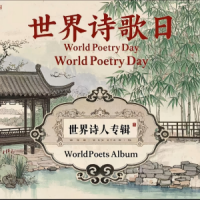
诗人的多语种交响(3)
——世界诗歌日“世界诗人专辑”
主编:祁人
副主编:海岸 曹谁
A Multilingual Symphony of Poets(3)
——World Poetry Day“Album of World Poets”
Editor in Chief: Qi Ren
Deputy Editor: Hai An Cao Shui
第3辑
17、Keshab Sigdel(凯沙布·西德格尔,尼泊尔)
18、Lamberto Garzia(兰伯特·加齐亚,意大利)
19、Lili(李犁,中国)
20、Marius Chelariu(马留斯·凯拉鲁,罗马尼亚)
21、Mark Lipman(马克·利普曼,美国)
22、Mimi German(咪咪·日耳曼【女】,美国)
23、Moaen Shalabia(摩安·沙拉比亚,以色列)
24、Podareva Anastasia(唐曦兰,俄罗斯)
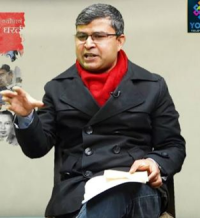
凯沙布·西德格尔(尼泊尔)
Keshab Sigdel(Nepal)
凯沙布·西德格尔(Keshab Sigdel),尼泊尔加德满都杰出作家、编辑和翻译家,在特里布万大学教授诗学。他著有诗集《时间的解体》(2007年)和《太阳的颜色》(斯洛文尼亚,2017年)。主编《当代尼泊尔诗歌选集》(美国,2016年),他还编辑文学杂志《尼泊尔粘土》、《鲁潘塔然》和《天文馆》。他把中国和尼日利亚的现代诗歌翻译成尼泊尔语。他最近的翻译作品是尼泊尔学院出版的《颜色的阴影》(尼泊尔本土诗歌的英译本)。他是世界诗歌运动国际协调委员会成员,尼泊尔英语作家协会副主席。他的诗歌已被翻译成数十种不同的世界语言出版。他获得了Bhanubhakta金奖(尼泊尔文化部,2014年)、Kalashree创意奖(2015年)、岩石文学奖(印度,2018年)、青年年文学动机奖(国家青年基金会,2018)和古吉拉特邦萨希提亚学院奖(2020年)。
Bio of Keshab Sigdel
Keshab Sigdel is the author of Samaya Bighatan ('Dissolution of Time', 2007) and Colour of the Sun (Poesis, 2017). He has edited Madness: An anthology of world poetry (RedPanda Books, 2023) featuring 297 poets from 101 countries/territories. He also edited a volume of Nepali poetry, An Anthology of Contemporary Nepali Poetry (Big Bridge, 2016). His recent work of translation Shades of Color (Nepal Academy, 2021), is a collection of indigenous Nepali poetry. Besides poetry, he also writes fiction, literary essays and plays. He is the Editor of Poetry Planetariat, a global poetry magazine published by World Poetry Movement. He also co-edited Of Nepalese Clay, literary journal of the Society of Nepali Writers in English and Rupantaran, a journal of translation published by Nepal Academy. Sigdel teaches Poetry and Literature of War, Conflict and Trauma at Tribhuvan University, Kathmandu.
一个梦的复活
——致巴勒斯坦人民
从城镇的废墟中
从死者的骨灰中
我们再次复活了。
我们出生在伯利恒
我们出生在加沙城
我们出生在拉马拉
我们出生在约旦河西岸
你咆哮着穿过轰隆作响的大炮
你付出了毕生所有的巨大努力
你大摇大摆地穿过强大的坦克
你用你所有的财富积累起来的
不幸依然从天而降
他们无情地杀害他们所面对的任何人
不分青红皂白地对待以色列人和巴勒斯坦人
或者任何昆虫或人类
你扔出死神无情的手
远方飞来惨痛的损失
同样漫长的地狱煎熬
但赋予我们更坚韧的灵魂
我们渴望历史能够揭示
我们审判的真相
我们有足够的道德勇气
为了坚决的雄起!
(Translated by Cao Shui)
Resurrection of a Dream
(In solidarity with the people of Palestine)
From the rubbles of the towns
From the ashes of the dead
We are born again.
In Bethleham we are born
In Gaza we are born
In West Bank we are born
In Ramallah we are born
You roar through the creaking canons
That you’ve engineered with great effort
You swagger through the mighty tanks
That you’ve accumulated with all your wealth
Unfortunately,
They mercilessly kill anyone they confront
Indiscriminate of the Israelis and the Palestinians
Or any insects or the humans
You tossed the death’s ruthless hand
And invited a harrowing toll
The same long suffering
But powered us with more resilient souls
We yearn for the history to reveal
The truth of our trials
And we have enough moral courage
For a resolute rise!
(Chinese translated by Cao Shui)
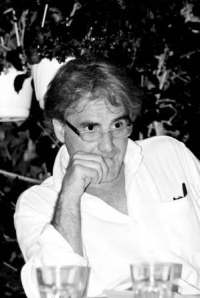
兰伯特·加齐亚(意大利)
Lamberto Garzia
兰伯特·加齐亚(Lamberto Garzia),意大利著名诗人、作家,意大利浮动世界文化协会主席,1965年出生在意大利圣雷莫。在法国尼斯和意大利罗马之间进行长期的波西米亚式漫游后,他目前居住在意大利利古里亚。他已经出版了三本诗集《兰伯特之歌》(朱塞佩·孔特作序);《莱达》(克劳迪奥·达米亚尼作序),《斗爱 - 爱的战斗》(由意大利著名现代诗人米洛·迪安杰利斯作后记)。其中部分作品被翻译到日本、中国、美国和法国等地。他创建了意大利最重要的《乌贼骨》诗歌奖,其名称来自意大利诺贝尔奖得主欧杰尼奥·蒙塔莱的获奖诗集。几十年来,他一直积极从事文化工作。他热衷于远东文化,多年来一直试图寻找一种可能的东西方文化融合的方式。他的诗歌被翻译发表到日本、中国、美国、法国、瑞典等国家。(曹谁/译)
骑士的想象
在这个词出现前或出现后
当舌头如同橡胶做的剑
这只是魔法,邪恶的人不是朋友
天真大胆在慢慢地生长——
敌人是普通的纸做的龙
不是来自天堂,而是来自火热的地狱,
彩虹向我们飘来
我的爱情和荣誉。
这里,此刻,不多不少,
更改姓名和面孔,
我不知道龙从哪里出现,
我不知道他是不是从天使那里借来翅膀
或者是为了一场无人知晓的灵魂的灾难
它决定在地球上停滞:
在我的房间里,固执而倔强。
(历史上的混乱或必然:
为什么不想再停在那里?)
Knight's premise
In the early years of the word or pastime –
when the tongue like rubber sword
it was just enchantment and the evil ones not friends
anything more that increase of naïve boldness –
the enemy was the usual papier-mâché Dragon
that no from heaven but from fiery underworld,
levitated towards us the rainbow
of my loves and my honor.
Here, now, and it is not much,
changing name and face,
I don't know where the Dragon comes from,
I don't know if he borrowed wings from angels
or if for a cataclysm of who knows what soul
it has decided to stall on earth:
in my room, stubborn and constant.
(What confusion in history or necessity:
What is it about not wanting to be there anymore?)
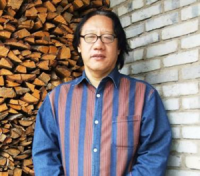
李犁(中国)
LiLi(China)
李犁:本名李玉生,辽宁抚顺人。属牛,性格像牛又像马。2008年重归写作,评论多于诗歌。出版诗集《大风》《黑罂粟》《一座村庄的二十四首歌》,文学评论集《烹诗》《拒绝永恒》,诗人研究集《天堂无门——世界自杀诗人的心理分析》;其中诗论集《烹诗》获第三届刘章诗歌奖和第十届辽宁文学奖文学评论奖,另有诗歌与评论获若干奖项。
北方
我要表达的就是这样的北方 纯净的天空
葱茏的人群和粮仓一样的灵魂
在温暖的炉火旁 写写文章
并不懂得北方的精神
风雪吹过家乡的屋顶
我把北方理解成一柄成长剑
质朴 平凡 而又锐不可挡
我就是在北方长大 经历了饥饿和寒冷
吃着粗粮 学会了写诗和思想
虽然过了许多年代
我依然能回忆起那些朴素而诚实的日子
我的嘴里便回升起生命的感觉
和我对北方发自心灵深处的感恩
而我在我的眼里北方就是乡下和农人
就是镰刀铧犁还有麦穗
这些哺育我们身体和精神的事物
如今 已在词典里生锈
我感到有什么在切割我们的根
有时候我真想抛弃这虚奢的生活
就像擦去餐桌上的油渍
回到乡下
做一个下等人
每天起粪 播种 收割
埋头劳作 沉默寡言
让庄稼的波浪一次次淹没我
夏天就不必说了
冬天就用泥抹上最后一扇窗
取几块木头扔进灶膛
对着漫天大雪 端起酒盅
这不是随便想想
这是我内心的圣歌
叶落归根 我还不敢忘本
汽车行驶在北方的平原上
窗外是那些割掉了头颅的庄稼茬子
和终于解放了的泥土
茫茫的黄昏下是那些背着谷物回家的人影
这不是一幅油画
我也不再是那个拾麦穗的孩子
一滴热泪压低了我的头颅
让我为这些平凡的事物
为这些农人和北方
祝福
What I want to express is just such north with pure sky, prosperous mass and granary-like soul
Beside warm fire, I write articles
Not understanding spirit of north
Wind with snow blows the roofs of my hometown
I understand that north is a sword
Simple, ordinary and irresistible
I grew up in north, experiencing hunger and cold
Eating coarse grain, I learned writing poems and thinking
Though it passed many years
I can recall those simple and honest days
The feeling of life and my thanks in my deep heart to
The north will arise in my mouth
While in my eyes
North is only village, farmers, sickles, ploughshares and wheat heads
These matters once fostered our bodies and spirits
Now, they have been our-of-date in dictionaries
I feel something is cutting our roots
Sometimes, I really want to give up such flaunty life
Just like wipe oil stain on the table
Returning to the countryside
To be a ragtag
Works on fertilizer, planting and harvest every day
Carefully works in silence
Bury myself in crop waves
In despite of summer
I winter, seals the last window with mud
Then take some pieces of wood and throw them into kitchen range
Facing dancing snow and holding small wine bowl
It is not just a dream
But the anthem in my heart
The fallen leaves return to their roots
I don’t dare to forget my root
The bus is running on northern plain
Out of the windows
There are crop stubbles without heads and the resting soil
In endless nightfall
Those figures carrying corns for going homes
Are not an oil painting
I’m not a child picking up wheat heads any longer
Tears in my eyes make me below my head
Let me wish
For these common matters
For these farmers and north
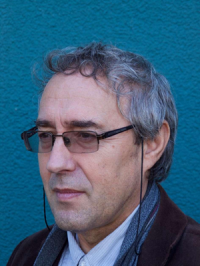
马留斯·凯拉鲁(罗马尼亚)
Marius Chelaru(Romania)
马留斯·凯拉鲁(Marius Chelariu,笔名 Marius Chelaru),1961年8月30日出生于罗马尼亚东北部瓦斯卢伊县(Vaslui county)的內格雷什蒂(Negreşti),于雅西(Iaşi)完成大学学业。诗人马留斯任多家罗马尼亚国内与国际文化杂志与期刊的编辑、负责人与撰稿人曾任欧洲杂志与出版协会(Association of Magazines and Publications in Europe) 秘书。马留斯与他人共同创立了诗歌与文化协会(Carmina Balcanica),出版同名东南欧文化评论杂志;共同创立文学、文明与文化双语(法语与罗马尼亚语)期刊Doina;于雅西创办欧亚诗歌与文化评论期刊文学之路(Kadō),。
马留斯是罗马尼亚作家协会(the Writers’ Union of Romania)成员,罗马尼亚专业记者协会(the Union of Professional Journalists in Romania)成员,日本环球诗歌协会(the Japan Universal Poetry Association)成员,罗马尼亚俳句社(the Romanian Haiku Society)成员,康斯坦察俳句社(Constantza Haiku Society)成员,日本世界俳句协会(The World Haiku Association)成员,魁北克罗马尼亚语作家协会(the Romanian Language Writers’ Union of Quebec)成员。
马留斯的作品包括文章、诗歌、随笔、文学批评、散文、翻译、访谈与书评,被收入多部国际作品选集,见于罗马尼亚、摩尔多瓦、美国、英国、比利时、加拿大、瑞典、巴拉圭、日本、伊拉克、埃及、约旦、越南、黎巴嫩、马其顿、科索沃、阿尔巴尼亚、荷兰等多个国家与地区的杂志与期刊。出版作品逾40种,包括小说、诗歌、文学批评、随笔与翻译等,个人作品集已被译为25种语言。曾获多项国内外奖项,如2005年与2014年凭借随笔作品获罗马尼亚作家协会雅西分会奖。
Marius Chelaru (ROMANIA) (name: Marius Chelariu, Pen Name: Marius Chelaru) was born in Negreşti, Vaslui county, Romania, on August 30, 1961; he graduated University in Iaşi. He is poet, editor/ director/ contributor of various national/ international cultural magazines and journals from Romania and abroad. He was Secretary of Association of Magazines and Publications from Europe. He is co-founder of:
- “Carmina Balcanica” Association, the institutional editor of “Carmina Balcanica”, Review of South-East European Spirituality and Culture
- „Doina”, Revue de Littérature, Civilisation et Culture Universelle, bilingue, franco-roumaine, Paris, France;
He is founder of: Kadō, The way of poetry, Review of Euro-Asiatic Poetry, Poetic Culture and Spirituality, Iaşi, Romania
He is a member of the Writers’ Union of Romania, of the Union of Professional Journalists of Romania, of the Japan Universal Poetry Association, of the Romanian Haiku Society, a member of Constantza Haiku Society, a member of The World Haiku Association (Japan), a member of the Romanian Language Writers’ Union of Quebec etc.
Chelaru contributed with articles, poems, essays, literary criticism, prose, translations, interviews, and book-reviews in various international anthologies, and magazines/ journals from Romania, Republic of Moldavia, USA, England, Belgium, Canada, Sweden, Paraguay, Japan, Iraq, Egypt, Jordan, Vietnam, Lebanon, Macedonia, Kosovo, Albania, Holland etc. He is a member of The Romanian Writers’ Society, the Constantza Haiku Society, the Haiku Romanian Society, the World Haiku Association, Japan, of the Romanian Language Writers’ from Québec, Canada
He published over 40 books (novels, poems, literary critique, essays, and translations). He has personal volumes in over 25 languages.
He was awarded some international and national prizes (including the Writers’ Union of Romania’ Prize, Iaşi Branch, in 2005, 2014).
堂吉诃德之死
死亡是世间灵魂之国
住着被身体抛下的诸多灵魂
我变得雪一样白,
寻找栖身之地的雪
如今的世界是肉身十字的森林
我们的梦被钉死在上面
翅膀被一枚枚有罪的沉默固定
在第一个世界做梦之后我想大喊
在爱情故事之后也是
啊,爱情故事在哪里?
我为你许的愿是
别让
自己被骗了
只有狐狸的狡猾
才会一头扎进
被可怜的堂吉诃德的巴比伦历史所杀的
悲伤、安静的脚步
我已将他深藏于我自由的瞬间里
一整晚
我感到自己从喀迈拉的身上下来
没有给那则故事留空间
回到
那故事滑入冷漠的那一刻
就在堂吉诃德死后不久
你发现自己身处
肉身十字的森林
堂吉诃德注视着你
用他不死之死后的
无数只眼睛
(陈汐 译)
Don Quixote’s death
death is a state of soul of the world
for so many souls left by the body
I have grown white like snow
that looks for a place to lie
today the world is a forest of flesh crosses
upon which our dreams die crucified
with their wings fastened on guilty silences
I felt like crying out after the dreams of the first world
and love stories
ah, where are love stories?
my wish for you
do not
let yourselves be deceived
it is but the cunning of the fox
that plunges into the sad quiet
of the footsteps killed by the Babylonian history
of poor Don Quixote
I have sequestered him in one of my free seconds
overnight
I felt like dismounting from chimeras
not leaving space for the story
coming back
to the moment when the story has passed into indifference
soon after that Don Quixote passed away
you find yourself
in the forest of flesh crosses
from which you are looked at
by Don Quixote’s numberless eyes
left
in the dead non-death
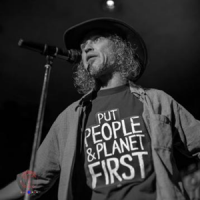
马克·利普曼(美国)
Mark Lipman(U.S.A.)
马克·利普曼(Mark Lipman),2024-2025年美国国家垮掉派桂冠诗人;流浪汉出版社、卡尔弗市图书节和厄尔巴岛诗歌节的创始人;2015年乔·希尔劳动诗歌奖获得者;2016年国际拉丁裔图书奖和2023年但丁桂冠奖(意大利拉文纳)。他是一位作家、诗人、多媒体艺术家、社会活动家和十五本书的作者,他的职业生涯始于在巴黎的莎士比亚剧团做常驻作家(2002-2003)。从那时起,他就与劳伦斯·费林盖蒂和杰克·赫希曼等传奇诗人在许多项目上密切合作,在过去的二十年里,他作为这一代人的主要代言人,在国际上建立了强大的追随者。他是KPFK 90.7FM洛杉矶诗人咖啡馆电台节目《世界各地的诗歌》的主持人和外国记者。随着马克继续周游世界,他用诗歌将社区与更大的社会正义问题联系起来,同时通过日常语言建立意识。 (曹谁/译)
Bio of Mark Lipman
Mark Lipman, US National Beat Poet Laureate 2024-2025; founder of the press Vagabond, the Culver City Book Festival, and the Elba Poetry Festival; winner of the 2015 Joe Hill Labor Poetry Award; the 2016 International Latino Book Award and the 2023 L’Alloro di Dante (Dante’s Laurel – Ravenna, Italy). He is a writer, poet, multi-media artist, activist and author of fifteen books, began his career as the writer-in residence at the world famous Shakespeare and Company in Paris, France (2002-2003). Since then he has worked closely with such legendary poets as Lawrence Ferlinghetti and Jack Hirschman on many projects, and for the last twenty years has established a strong international following as a leading voice of his generation. He’s the host and foreign correspondent for the radio program, Poetry from Around the World, for Poets Café on KPFK 90.7FM Los Angeles. As Mark continues to travel the world, he uses poetry to connect communities to the greater social justice issues, while building consciousness through the spoken word.
边界越过了我们
我踏上了陆地
我的祖先在这里
种下我们的家谱
在一千多年前。
我不知道其他沙子
在我的脚趾间
就在我的脚下
这是我唯一的家园。
但在一个奇怪的日子
一个陌生人到来
在我们的桌子旁坐下
喝了我们的啤酒
吃了我们的面包
强奸了我们的女人
烧毁了我们的村庄
然后宣布我是非法居住。
我皮肤的颜色
我舌头上的语言
我选择信仰的上帝
全部被妖魔化,
以证明他们的残忍是正当的。
我所享受的自由
所拥有的自决权
消失了,又一个受害者
军事占领。
我的和平,
只是一根折断的橄榄枝
他们从树上砍下来。
我的家园,
铁轨下的瓦砾
他们的推土机。
我曾拥有的一切
我所知道的一切
一切,从我身上夺走。
我的血,
变成了他们的黄金。
我的心,
世代相传
谎言和背叛。
如果你割伤我,我不会流血吗?
破碎,在技术的保护下
没有灵魂或身体可以触摸的人
没有心去感受
眼睛,被仇恨所蒙蔽
耳朵,始终都被遮掩
嘴巴,因恐惧而紧闭
舒适地蜷缩在床上
当人们都死在街上
在警棍和炮弹的掩护下
一个军事化的警察国家
用旗子把自己裹起来
更糟糕的是单一宗教
同时为种族灭绝找借口
批准大批量地谋杀儿童。
新闻演员继续指责受害者
强迫我们撒谎,称我们为恐怖分子
因为我们出生在他们垂涎的土地上。
谁才是真正的敌人,
相信与你不同的东西的人,
还是那个用你的信仰来改变你的人?
灵魂凝视着镜子,无法逃脱
无论地图上的线条如何移动
人权永远没有国界。
(Translated by Cao Shui)
The Border Crossed Us
I step onto land
where my ancestors
planted our family tree
over 1,000 years ago.
I have known no other sand
between my toes
under my feet
this is my only home.
One day though
a stranger arrived
sat down at our table
drank our wine
ate our bread
raped our women
burnt our village
then declared me illegal.
The color of my skin
the language on my tongue
the god that I chose to believe in
demonized in order to justify their cruelty.
The freedom that I enjoyed
my right to self-determination
gone, victim to yet another
military occupation.
My peace,
simply a broken olive branch
cut from the tree they tore down.
My home,
rubble, beneath the tracks
of their bulldozers.
All I have ever had
all that I’ve ever known
all, taken from me.
My blood,
turned into their gold.
My heart,
broken from generations
of lies and betrayals.
If you cut me, do I not bleed?
Crushed, beneath the boot of technology
by persons with no soul or body to touch
with no heart to feel
eyes, blinded by hatred
ears, closed to any reason
mouths, shut out of fear
comfortably tucked away in their beds
while human beings die in the streets
under the batons and artillery shells
of a militarized police state
Wrapping oneself in a flag
worse yet, a religion
while making excuses for genocide
sanctioning the murder of children.
News actors continue to blame the victims
force feeding us lies, calling us terrorists
because we were born onto the land that they coveted.
Who is the real enemy,
the one who believes in something different than you,
or the one who uses what you believe in to change who you are?
There is no escaping the soul staring back in the mirror
regardless of the shifting lines on some map
human rights have no borders.
(Chinese translation by Cao Shui)
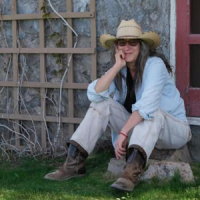
咪咪·日耳曼(美国)
Mimi German(U.S.A.)
咪咪·日耳曼(Mimi German),是一位美国诗人,和平与反核活动家,为不圣洁的人辩护,著有三本诗集。2023年,她被国家节拍诗歌基金会授予俄勒冈州节拍桂冠诗人称号。她也是诗人星球(PoP)的成员。她的诗已被翻译成阿拉伯语、希伯来语、汉语和爱尔兰语。俄勒冈州的斯滕斯山和阿尔福德沙漠的荒野是她的家。 (曹谁/译)
Bio of Mimi German
Mimi German is an American poet, a peace and anti-nuclear activist, advocate for unhoused people, and author of three books of poetry. In 2023, German was named the Oregon Beat Poet Laureate by the National Beat Poetry Foundation. She is also a member of Poets of the Planet. Her poems have been translated into Arabic, Hebrew, and Irish. The wilderness of Oregon’s Steens Mountain and the Alvord Desert is her home.
加利利熏花
加利利熏花,黎巴嫩附近以色列哈尼塔森林中极为罕见的花。
——题记
你是对我说吗?
从大河到大海
你渴望发现的
都是花开的路
你已经看到了
野郁金香孵化
在高高的北山上
发现最稀有的花
就像紫罗兰色的和平
这世间实属罕见
看到的人太少,
以至不敢相信
这可能是真的
当你看到盛开的百合花时
感觉花瓣在你的灵魂中
那光芒和恩典变得充足
从加利利山开始
向南进入大海
它给你看过花吗
让我们都看过吗
我确信这一定是
你说这话是什么意思
从大河到大海
我们都是花
我们都是花
(Chinese translation by Cao Shui)
Galilee Fumitory
——Galilee Fumitory, an extremely rare flower in Israel’s Hanita Forest near Lebanon
did you mean by saying
from the river to the sea
that you yearn to discover
the flowering path
that you have seen
the wild tulips hatch
upon the northern hills
and spotted the rarest flower
like a violet-colored peace
so extremely rare
seen by too few to believe
it could be real
when you saw the flowering lily
felt its petals in your soul
that light and grace grow plentiful
from the hills of galilee
south into the sea
did it show you that of flowers
all are we
i’m certain this must be
what you meant when you said
from the river to the sea
of flowers all are we
of flowers all are we
(Chinese translation by Cao Shui)
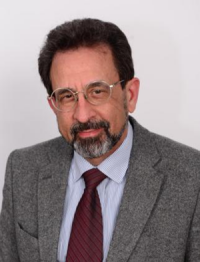
摩安·沙拉比亚(以色列)
Moaen Shalabia(Israel)
摩安·沙拉比亚(Moaen Shalabia),出生于加利利海地区的马戈哈尔城,以色列的巴勒斯坦族诗人。他在海法大学完成了学业。诗人和散文作家。他出版了九本诗集和三本散文集。他参加了世界各地的许多国际诗歌节。他被“阿拉伯知识分子论坛”(耶路撒冷圣城)授予奖章。他是阿拉伯作家联盟和世界诗人运动的成员。他的文学作品在大学里受到了讨论和批评。他的一些诗被翻译成多种语言,他的诗被收录在国内外选本中。他在国际诗歌节上获得了害虫诗歌奖,特托娃-马其顿/阿尔巴尼亚。他最近获得了“阿拉伯作家联盟”诗歌大奖。(曹谁/译)
Bio of Moaen Shalabia
Moaen Shalabia, Born in Maghar town - In the sea of Galilee region. Palestinian poet, One of the Arab Palestinian national minorities in Israel. Finished his studies at Haifa University. Poet and prose writer. He published nine poetry books and three prose. He participated in many local and international festivals around the world. He was awarded by the "Arab intellectual's forum" – Jerusalem Al-Quds). Besides, he has received many appreciations certificates. A member of the union of Arab writers and the World Poetry Movement. His literary production was discussed and criticized in universities and many sessions in the homeland and abroad. Some of his poems were translated into many languages and his collection of poems was included in the national and international anthologies. He won the prize of pest poetry at the international poetry festival Tetova – Macedonia / Albania. He recently won the big prize of the "Arab Writers Union" for poetry.
我从前不认识她
我从来不认识她;
她哀怨的信件却在我耳边颤抖,
当我看着她那可怜的身体时,
我看到了第一位美丽的女神,
她头顶和脖子之间扛着黑夜,
在她赤裸的胸膛上,
有两颗象牙石榴,
在她的内心深处,
有墙壁、黑暗、寂静和地平线上的鲜血。
她既没有活着也没有死去,
这是一个狂野而孤独的地方,
我在她身上见证了精神和身体的缺失,
撕裂和赤裸,没有家园,
我毫不掩饰地激情地跟她交谈:
在正义的时刻我会抱紧
你哭泣的脸庞,你呻吟的眼睛。
在恐惧和颤抖的夜晚,
我看到一滴温暖的泪水,
她梦幻般的眼睑崇拜着闪电和雷鸟,
我说:来我这里,你是我的女人;
强奸一个女人就是强奸祖国,
两面旗帜没有区别,
强奸犯就像致命的占领者;
他们死了,但又回来。
I Did Not Know Her Before
I did not know her before; nevertheless, her whining letters trembled in my ears,
but as I cast my eyes upon her poor body, I saw the first goddess of beauty, carrying the night between her head and her neck,
and on her bare chest, two ivory pomegranates,
and behind her heart, there are walls, darkness, silence, and blood on the horizon.
She was neither alive nor dead, wild and lonely is the place,
I witnessed in her, the absence of spirit and body, torn and naked without a homeland,
I spoke to her unabashed, with passion and loyalty:
I will hold your crying face, your moaning eyes, together in the moment of justice.
I saw a warm tear in the night of fear and shiver,
and her dreamy eyelids adored the birds of lightning and thunder, I said:
Come to me how you are my woman;
The rape of a woman is the rape of homeland, no difference between the two flags,
The rapists are like the deadly occupiers; they are dead, but
came back again.

唐曦兰(俄罗斯)
Podareva Anastasia(Russia)
唐曦兰(Podareva Anastasia),1995年,出生于俄罗斯梁赞市(楚瓦什-斯拉夫族);现居上海;俄罗斯青年女诗人、翻译家、艺术家;2017年毕业于浙江理工大学史量才新闻与传播学汉语言文学本科生、2021年毕业于浙江理工大家艺术与设计学院艺术学理论硕士研究生;自2020年是丝绸之路国际诗人联合会(英文:SILK ROAD INTERNATIONAL POETS FEDERATION)国际诗歌传播大使。作品已发表于多种中国诗歌刊物;用俄、中及英三种语言作诗,绘画、摄影艺术、演戏、朗诵、主持及多平台媒体博主。个人作品集:《唐曦兰的诗》、《夜梦》、《幽兰凝香》诗歌风格:“俄意中韵”绘画风格:抽象派2016年至2024年期间多次获文学及艺术奖。
雷
花却了夏青,晚来骤雨,
沐上一纱新衣……电闪雷鸣。
田野屏住了呼吸,
沉默仿佛踌躇不行。
暮色凝视着人间,掩碎天火,
万籁俱惊,如河水般流快,
天使双眼滚着浪潮,
翻覆无定。
似乎海水溢出,
无彼无此,
丝风拂过颜面,黑渍——
荡涤着蔚蓝的天空,
优雅的舞者也一样多情。
墨色的布绸,
伫立窗前,
只见太阳的最后一缕光芒,
来也匆匆,在黑暗中,
模糊战胜主角,
地平共云线,合两为一,
仿佛有梦魇遮住了眼眸。
结局已经来临,
何有救赎的希望,
一片混乱的片刻,
又是一场洗礼,那是光芒——
信将再次绽开笑容。
正如人生,难如登天过后,
幸运的一灯,会再次亮起,
前方轮转不息……
Гроза
Пришла гроза,
Гроза подобно буре.
Природа, затаив дыханье,
Затихла, будто в ожидании.
И вот уж молнии сверканье,
Раскаты грома и тогда;
Вдруг с неба хлынула вода.
Казалось, океан разлился.
И у него ни дна, ни берегов,
Срываясь хрипом ветер злился,
Закручивая вальс из облаков
Которые, меж небом и землёй,
Под не прекращающийся вой,
Танцуют дикий танец свой.
В круговороте чёрных туч,
Которые как горы встали,
Мелькнул последний солнца луч,
Лишь на секунду осветивши дали,
Которые во тьме не видны стали.
А горизонт с землёю слился,
И мрак на землю опустился.
И кажется конец настал,
И нет надежды на спасенье.
Но это всё столпотворенье,
Несёт как будто очищенье,
И солнце вновь осветит дали.
Вот так и в жизни, после бед
Удачи загорится свет.